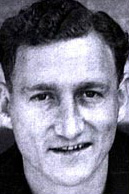Australian rules footballer
| Lindsay White | |||
|---|---|---|---|
 | |||
| Personal information | |||
| Full name | Lindsay G. White | ||
| Date of birth | (1922-01-05)5 January 1922 | ||
| Date of death | 13 March 1977(1977-03-13) (aged 55) | ||
| Original team(s) | Orford | ||
| Height | 185 cm (6 ft 1 in) | ||
| Weight | 83 kg (183 lb) | ||
| Playing career | |||
| Years | Club | Games (Goals) | |
| 1941 | Geelong | 17 (67) | |
| 1942–1943 | South Melbourne | 25 (111) | |
| 1944–1950 | Geelong | 100 (362) | |
| Total | 142 (540) | ||
| Playing statistics correct to the end of 1950. | |||
| Career highlights | |||
| |||
| Sources: AFL Tables, AustralianFootball.com | |||
Lindsay G. White (5 January 1922 – 13 March 1977) was an Australian rules footballer who represented Geelong and South Melbourne in the Victorian Football League (VFL) during the 1940s.
White was regarded as one of the best forwards of the 1940s. He was fast on the lead, was a strong overhead mark and possessed a long and accurate kick.
He kicked 67 goals in 1941, his debut season for Geelong, but at the end of the year Geelong went into temporary recess due to travel restrictions during World War II and White transferred to South Melbourne. He spent two seasons there, kicking 111 goals in 25 games and leading the league goalkicking in 1942. White returned to Geelong for the start of the 1944 season and was named club captain in 1948. In that year he again won the league goalkicking, with 86 goals.
White played until halfway through the 1950 season, retiring due to a debilitating injury to his achilles tendon.
He was playing coach of the Queanbeyan-Acton side that were premiers in the 1956 Canberra Australian National Football League season. In the grand final win over Manuka, White kicked the two goals needed to bring his season tally to 100 goals.
References
- Holmesby, Russell; Main, Jim (2002). The Encyclopedia of AFL Footballers: every AFL/VFL player since 1897 (4th ed.). Melbourne, Victoria: Crown Content. p. 688. ISBN 1-74095-001-1.
- ^ Coleman Medal winners Archived 24 September 2012 at the Wayback Machine
- Geelong honour roll Archived 11 February 2009 at the Wayback Machine
- "White (Geelong & South Melbourne) Biography at Full Points Footy". Archived from the original on 7 June 2011. Retrieved 8 February 2010.
- "Combine Side Seen As Best Since Before War". The Canberra Times. 18 September 1956. p. 12. Retrieved 21 April 2014 – via National Library of Australia.
- "Combine Takes Premiership By Safe Margin". The Canberra Times. 17 September 1956. p. 16. Retrieved 21 April 2014 – via National Library of Australia.
External links
- Lindsay White's playing statistics from AFL Tables
| Captains of the Geelong Football Club | |
|---|---|
| Pre-VFA | |
| VFA | |
| VFL/AFL |
|
| AFL Women's | |
| VFL Leading Goalkicker Medal winners | |
|---|---|
| The Leading Goalkicker Medal was awarded from the VFL's first season, in 1897, until 1954, when the award was renamed the Coleman Medal. | |
|
| 1948 Sporting Life Team of the Year | |
|---|---|
| Defenders | |
| Midfielders
| |
| Forwards
| |
| Followers
|